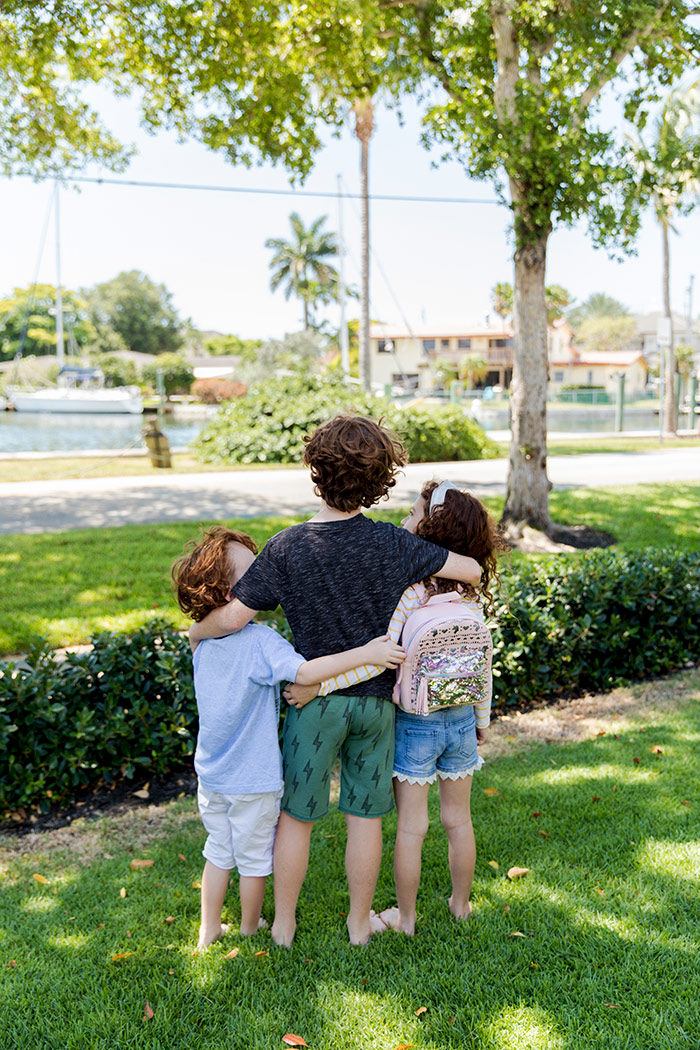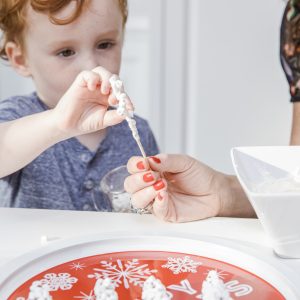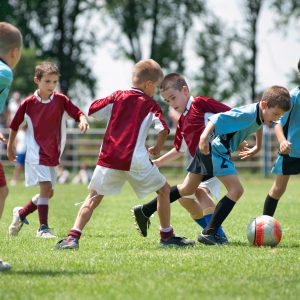
“Show Me Your Friends, and I Will Show You Who You Are.”
“Show me your friends, and I will show you who you are.” This quote could not be more accurate. As I embark on the journey of parenting tweens and middle school kiddos, which is so nerve wracking and exciting all at once, this quote truly resonates with me and my family. Finding and holding onto positive peer friendships has been a defining factor in my life.
I feel beyond fortunate that the friends I grew up with who were most influential in my life are still my close friends whom I love and adore. To this day, the people who influenced my development through childhood and adolescence still have a positive impact on me. It’s even more meaningful to watch our children become friends, play together, and create a new lifetime of memories and experiences just like we did growing up.
Knowing the kind of people “my crew” of friends were growing up, knowing what positive impacts they had on me as a child and to this day, and knowing the kind of people they are raising, provides me with confidence and pride that my babies are surrounding themselves with amazing people. It is important for our children to form friendships with others who have similar values, likes, morals, and upbringings. So today, let’s discuss how to help your children choose peer friendships that positively shape their development, self-esteem, and outlook on life.
#TalkEarly Summit
Julie Foudy on Peer Friendships
There are some people in this world who truly make a mark on your life. People you meet, even for a brief moment, who not only teach you something new, but impact the way in which you live your life.
For me, one of those people is Julie Foudy.
Julie is a two-time FIFA Women’s World Cup champion and Olympic gold medalist. She played for the United States women’s national soccer team, finished her international career with 271 caps, and served as the team’s co-captain and later captain. She founded the Julie Foudy Leadership Academy and recently launched a podcast called Laughter Permitted.
I had the pleasure of meeting Julie in Washington at the #TalkEarly Summit a few months ago. As a partner with Responsibility.org and a member of the #TalkEarly Team, I hope to guide parents through raising respectful leaders who make responsible decisions about alcohol and life.
Julie Foudy – “Who Lifts You Up?”
Being a mother of two girls and a force of nature on the soccer field, Julie’s words and advice at the summit truly inspired me. One topic Julie discussed was the importance of our children’s inner circle of friends – those peer friendships they choose for themselves – and how impactful positive (or negative) friendships are in their development. She posed the question, “Who lifts you up?” to encourage us to think about our own positive peer friendships throughout life and how to foster those same types of relationships for our children.
“You have the power to replace the negative with the positive. Teach this to your kids. You have the power and make the decision that you care enough to speak up.”
I took a lot from this quote in the context of friendships and teaching our kids to speak up and to change their path with a negative friendship. They ultimately have the power to choose positive peer friendships. They also have the power to speak up when a friend is behaving badly to another friend or even as they get older in terms of peer pressure and making responsible choices. Starting at an early age, children have the power to choose their own “squad.” And the decisions our children make now can impact their lives forever.
As parents, it is our responsibility to give them the right tools to choose wisely.
Choosing the Best “Squad”
Parenting is a journey that changes so quickly. For babies and young children, parents are the most important, impactful, and influential people. I call this the “needy phase” where all they want and need is you. It can be daunting and overwhelming. Yet it is also reassuring to know the interactions and experiences we have with our children at that young age represent the morals, values, decisions, and behaviors we would like them to model.
But in the blink of an eye, our babies grow up and start to worry less about our opinions and more about what their friends think of them, what their friends are doing, and whether they feel accepted and liked by their friends. I like to call this the “pre-independent glory phase.” We get some reprieve from giving our children constant attention, yet they still need and look up to us for ultimate guidance and unconditional love. Parents lose a bit of control and impact on the decisions our children make at this age as they often rely on the friends with which they surround themselves.
As the parenting journey continues into the teen and high school years, friends become the most important, impactful, and influential people in our children’s lives. I like to call this the “independent phase” of parenting.
It’s a scary thought.
Friends are the most important, impactful, and influential people in our children’s lives. So as parents, it is our job to guide our children to choose their very best “squad.” These friends may very well help lead them into adulthood as motivated, inspired, smart, and just downright decent human beings.
My Top Tips for Encouraging Positive Peer Friendships
Speak to you children about choosing their friends at a young age and guide them to chose good people. Encourage them to choose friends with positive attributes and qualities that reflect the same kind of morals and beliefs want your children to embody.
Start your journey with these tips!
1. Get to Know the Parents
Know your children’s friends’ parents and schedule playdates for everyone to hang out (parents and children). I believe a child’s parents can reveal a lot about them and who they will grow up to be. It is so important to know your child’s friends’ parents embody similar values, goals, and morals.
2. Pay Attention
Do not tune out when children are playing together – listen to their interactions and how they speak to each other. Listen to the words they use, the things they like to do, and how the children play together.
Are your child’s friends respectful and nice? Do they discuss age appropriate matters and provide a positive role model for your children? Although so easy to tune out and get a reprieve from the kids when they are playing so independently with their friends, it is important to observe how they interact and what they discuss. It is especially important when meeting new friends who are not as familiar to you.
3. Find Common Ground
Try and encourage your children to meet friends who have similar interests as them, whether it be sports, music, hobbies, scholarly interests, or other friends. As your children and their friends become older, they will inspire and motivate each other through life choices. If your child’s friends have similar interests, they will influence each other and have an easier time making some tough decisions and positive choices.
4. Talk Openly and #TalkEarly
Speak to your children about their friends. Ask them questions like “What do you guys do together?” or Do you ever fight, and if so, what do you fight about?” You can learn a lot about the types of friends your child has now by asking a few questions. So be inquisitive and curious. As our children get older, they will be less likely to answer such questions. But if you make it a point to ask these questions now, it will be something they see as natural.
5. Quality is Key
Encourage your kids to identify quality friendships over quantities of friends. More is not always better. High quality friends will lift your child up when they are down. Positive friends will help foster your child’s likes and encourage them to explore their dreams, hopefully throughout their lives! Quality peer friendships are vital to your child’s self-worth and self-esteem.
6. Social Media is NOT Reality
Speak to your children about social media friends vs. true friends. We live in a day and age where children are consumed with appearance and status on social media. So teach them that reactions, likes, followers, and engagement on social media is NOT a reflection of true friendship.
Final Thoughts
Parenthood is challenging and all encompassing. Whether our children are in the “needy phase” of baby life, “pre independence phase” of starting to branch out to the influence of others, or the daunting and exciting teen “independent phase,” it is important to guide them to choose quality friends. Having the right tools to navigate challenges as they get older is paramount. So choosing the very best people to help guide them through these situations is key. Whether positive or negative, “our squad” of friends can greatly impact our emotional development, life choices, and morals into adulthood.
There is nothing more important than teaching our children to surround themselves with motivated, inspired, and encouraging people. It’s especially vital as they head into the older years of childhood. Friends may be the most impactful people our children will surround themselves with as young adults. And, if lucky, they will maintain these friendships into adulthood like I have.
So I strongly urge every parent to speak with their kids about positive peer friendships, making wise decisions, and being responsible leaders for their friends and peers. If you need conversation starters or other resources, check out Responsibility.org!
Dr. Katie





GREAT ARTICLE KATIE!!!! AND SOOOOO TRUE!